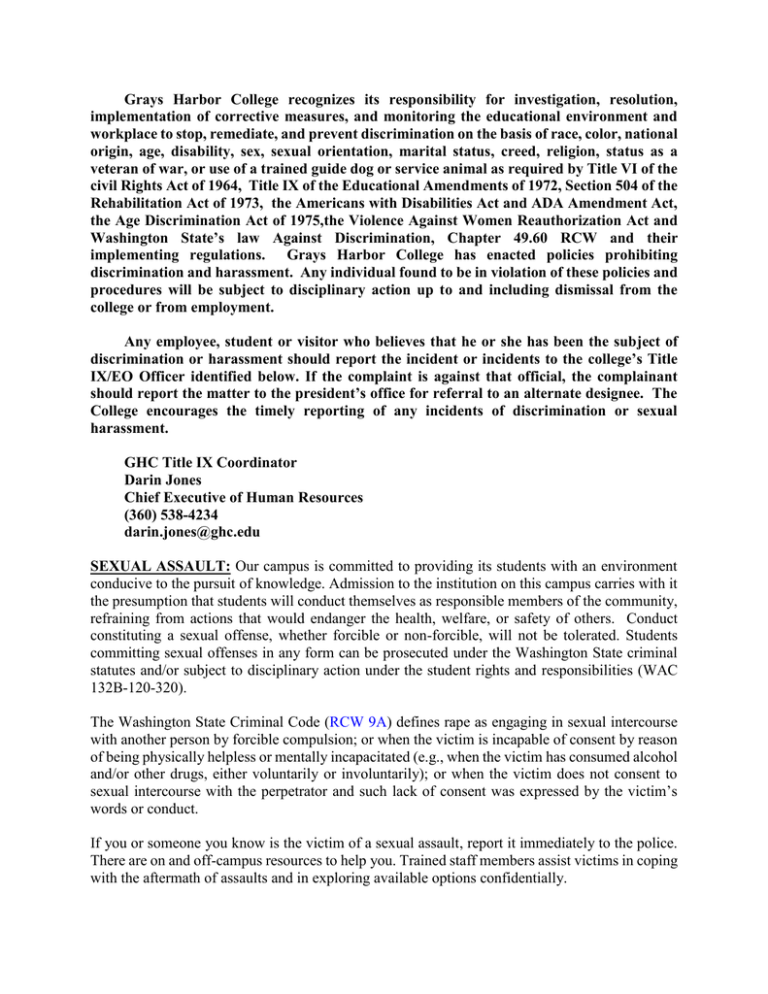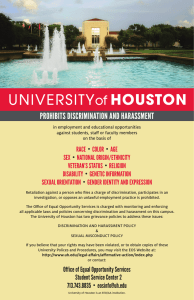
Grays Harbor College recognizes its responsibility for investigation, resolution,
implementation of corrective measures, and monitoring the educational environment and
workplace to stop, remediate, and prevent discrimination on the basis of race, color, national
origin, age, disability, sex, sexual orientation, marital status, creed, religion, status as a
veteran of war, or use of a trained guide dog or service animal as required by Title VI of the
civil Rights Act of 1964, Title IX of the Educational Amendments of 1972, Section 504 of the
Rehabilitation Act of 1973, the Americans with Disabilities Act and ADA Amendment Act,
the Age Discrimination Act of 1975,the Violence Against Women Reauthorization Act and
Washington State’s law Against Discrimination, Chapter 49.60 RCW and their
implementing regulations. Grays Harbor College has enacted policies prohibiting
discrimination and harassment. Any individual found to be in violation of these policies and
procedures will be subject to disciplinary action up to and including dismissal from the
college or from employment.
Any employee, student or visitor who believes that he or she has been the subject of
discrimination or harassment should report the incident or incidents to the college’s Title
IX/EO Officer identified below. If the complaint is against that official, the complainant
should report the matter to the president’s office for referral to an alternate designee. The
College encourages the timely reporting of any incidents of discrimination or sexual
harassment.
GHC Title IX Coordinator
Darin Jones
Chief Executive of Human Resources
(360) 538-4234
darin.jones@ghc.edu
SEXUAL ASSAULT: Our campus is committed to providing its students with an environment
conducive to the pursuit of knowledge. Admission to the institution on this campus carries with it
the presumption that students will conduct themselves as responsible members of the community,
refraining from actions that would endanger the health, welfare, or safety of others. Conduct
constituting a sexual offense, whether forcible or non-forcible, will not be tolerated. Students
committing sexual offenses in any form can be prosecuted under the Washington State criminal
statutes and/or subject to disciplinary action under the student rights and responsibilities (WAC
132B-120-320).
The Washington State Criminal Code (RCW 9A) defines rape as engaging in sexual intercourse
with another person by forcible compulsion; or when the victim is incapable of consent by reason
of being physically helpless or mentally incapacitated (e.g., when the victim has consumed alcohol
and/or other drugs, either voluntarily or involuntarily); or when the victim does not consent to
sexual intercourse with the perpetrator and such lack of consent was expressed by the victim’s
words or conduct.
If you or someone you know is the victim of a sexual assault, report it immediately to the police.
There are on and off-campus resources to help you. Trained staff members assist victims in coping
with the aftermath of assaults and in exploring available options confidentially.
Sexual Assault Resource Center
Rape Response Line
Crisis Clinic
GHC Counseling Center
Family & Friends of Violent Crime Victims
(360) 533-9751 or 888-626-2640
(360) 538-2292 or 1-800-986-1202
(360) 532-4357 or 1-800-685-6556
(360) 538-4099
1-800-346-7555
VICTIMS OF SEXUAL ASSAULT: If a sexual offense should occur, the victim should take the
following actions:
1. Go to a safe place.
2. Call 911.
3. Police will contact counseling and victim’s advocate services.
4. Contact a friend or family member.
5. Do not shower, bathe, or douche.
6. Do not urinate, if possible.
7. Do not eat, drink liquids, smoke or brush teeth if oral contact took place.
8. Keep the clothes worn during the offense. If clothes are changed, place clothes in paper bag
(evidence deteriorates in plastic).
9. Get prompt medical attention.
10. Do not destroy the physical evidence that may be found in the area of the crime. The victim
should not clean or straighten until the police have had an opportunity to collect evidence.
11. Write down all details remembered as soon as possible.
Sexual assault and rape awareness materials in the form of flyers and brochures are located in the
HUB (100 Building), Counseling Center (100 Building) and from the Chief of Campus Operations,
Safety and Security.
SEXUAL HARRASSMENT: GHC, as a place of work and study, aspires to be maintained free
of all forms of harassment, discrimination, intimidation, and exploitation. Members of the college
community should be aware that the college will take action to prevent and correct such behavior
and those individuals who engage in such behavior are subject to discipline. Retaliation against
any employee, student, applicant, or volunteer who reports harassment is also subject to discipline.
Sexual harassment complaints should be referred to the Vice President for Student Services (Room
110) involving student(s) or the Human Resources Office (Room 2307) involving employees.
Complete copies of GHC’s Sexual Harassment Operational Policy may be obtained in the Office
of Student Services (Room 110).



